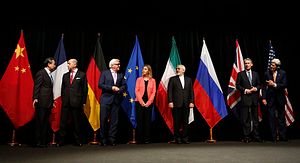Pyongyang, as many pundits predicted, has ratcheted up its peace offensive toward Seoul since the Seventh Workers’ Party Congress took place in May. Indeed, between May 20 and 22 the North repeatedly called for South-North military talks via various channels, including the National Defense Commission, the Ministry of the People’s Armed Forces, and the Committee for the Peaceful Reunification of the Fatherland.
On the surface, it may seem as though North Korea is calling for peace, as it contends that the talks should be held to “defuse the military tension on the Korean Peninsula and build mutual trust between the South and North Korean military in order to break away from the disgraceful past and move on to a new beginning.” However, the timing seems a little too convenient, considering North Korea’s other recent outreaches: Director Kim Yong-chol of the United Front Department’s visit to Cuba, Presidium President Kim Yong-nam of the Supreme People’s Assembly’s attendance at the presidential inauguration of the Republic of Equatorial Guinea, and Russia’s announcement of their own independent sanctions against the North. The North’s current peace rhetoric undoubtedly reflects a desperate attempt to create a rift in the international commitment regarding sanctions and win acceptance as a nuclear-weapons state.
Against this backdrop, the South’s Ministry of National Defense rightfully demanded the North “demonstrate its commitment to denuclearization” and rejected the overture.
If North Korea is genuinely determined to reason itself out of the current predicament, it should call for “real nuclear talks” to negotiate the terms and procedures of renunciation, rather than ramping up its phony peace offensive to be accepted as a nuclear-weapons state. Tehran’s nuclear agreement, in this regard, creates an important precedent for Pyongyang.
Iran’s nuclear ambition was sparked during the Pahlavi dynasty and seemed to cease after the Iranian Revolution of 1979. However, an anti-government organization, the National Council of Resistance of Iran, exposed the government’s attempt to build up nuclear capability in 2002, making its nuclear issue a global concern. In 2005, when anti-U.S. and anti-Western Mahmoud Ahmadinejad won the presidential election, the nuclear negotiations between the international community and Iran faced multiple pitfalls. Iran’s economy went downhill due to strong economic sanctions imposed by the United Nations, the United States, and the European Union, including an oil embargo and ban on financial transactions. Iran’s citizens were hit by a recession, high unemployment, and explosive inflation.
The nuclear dialogue was quickly renewed as the leader of moderate-reformist bloc, Hassan Rouhani, was voted into office in 2013. Finally the Iran deal was clinched on July 14, 2015. Iran, through this deal, agreed to go through with the International Atomic Energy Agency’s comprehensive and full inspection on all nuclear facilities and activities, special inspection on military facilities, and intrusive inspection including conducting interviews with domestic nuclear scientists. In return, Tehran was granted a right to enrich uranium up to 3.67 percent and allowed to continue its atomic program for peaceful purposes. Now that all the economic sanctions against Iran have been lifted starting in 2016, it will be only a matter of time before oil-rich Iran, with its flourishing culture, regains economic vitality.
There have been a number of cases where countries either developed or tried to develop nuclear weapons but abandoned the plan in the process. For example, the Republic of South Africa voluntarily disarmed its secretly-built nuclear weapons and chose to denuclearize, and Ukraine abolished and/or returned the remaining nuclear weapons of the former Soviet Union to Russia in return for security assurance and economic support. The Gaddafi administration of Libya gave up on building weapons of mass destruction, agreeing to Britain’s arbitration when faced with crippling pressure from the United States’ economic and diplomatic sanctions. The Hussein administration of Iraq, which developed a nuclear capability and invaded Kuwait, was led to a wretched end.
The best case scenario of denuclearization for North Korea would be that of Iran. Iran gave up on developing nuclear weapons but obtained the right to continue its atomic program for peaceful uses; in other words, it cleverly saved face while liberating the Iranian people from isolation and poverty.
Granted, Pyongyang, unlike Iran, has advanced its nuclear weapons program to such a point that a full rollback to zero weapons is not politically feasible. The North Korean regime has already carried out four nuclear tests and urgently tried to deploy nuclear weapons while spurring efforts to develop submarine-launched ballistic missiles (SLBMs) and inter-continental ballistic missiles (ICBMs). In fact, the regime praised “the building of nuclear capability” as the most monumental accomplishment of Kim Jong-un at the Seventh Workers’ Party Congress, and it defined itself as a nuclear-weapons state in its ruling party bylaws, declaring de facto nuclear-first politics. The North also identified itself as a nuclear-possessing state in the country’s 2012 constitution, and it has repeatedly stated that it would on no account give up on nuclear arsenals. In this regard, the Kim Jong-un regime, “of the nuclear, by the nuclear, for the nuclear,” may find it even more difficult to pursue denuclearization in comparison to Iran.
Nevertheless, Pyongyang has no better route of denuclearization than the Iranian way. The North should keep in mind that Iraq and Libya were led to implosion, and foreign powers exerted influence in both countries, because the Hussein and Gaddafi governments pursued nuclear capability and their people suffered the consequences. If North Korea is to sustain the regime and breath life into the domestic economy, it will have to find a win-win solution to resolve its nuclear conundrum by drawing lessons from the Iran deal instead of proposing a “fake dialogue” to justify its possession of nuclear weapons. Pyongyang should remember how thrilled the people of Tehran were at the news of the landmark deal reached on July 14, 2015.
Kim Tae-woo is Professor at Konyang University and former president of the Korea Institute for National Unification.

































